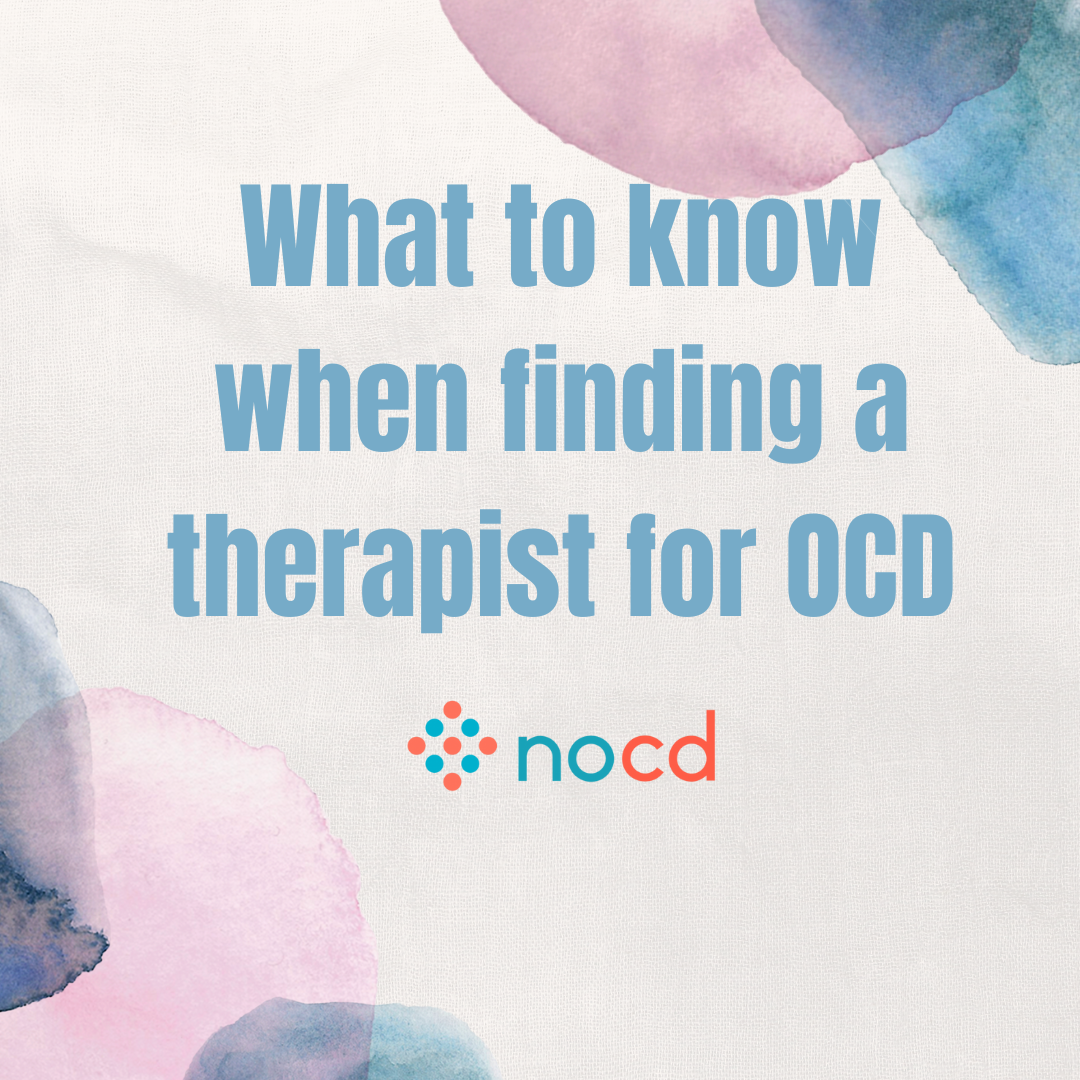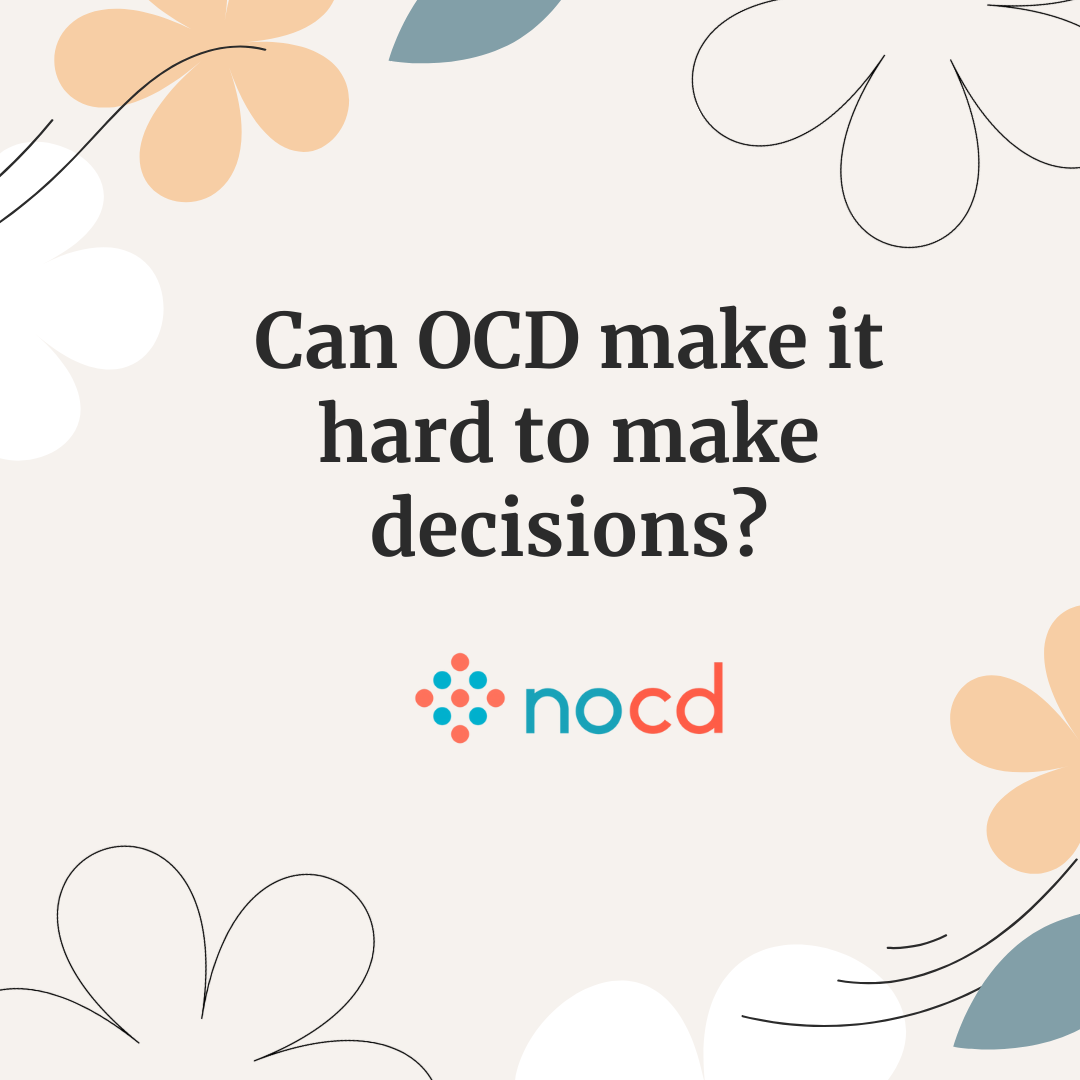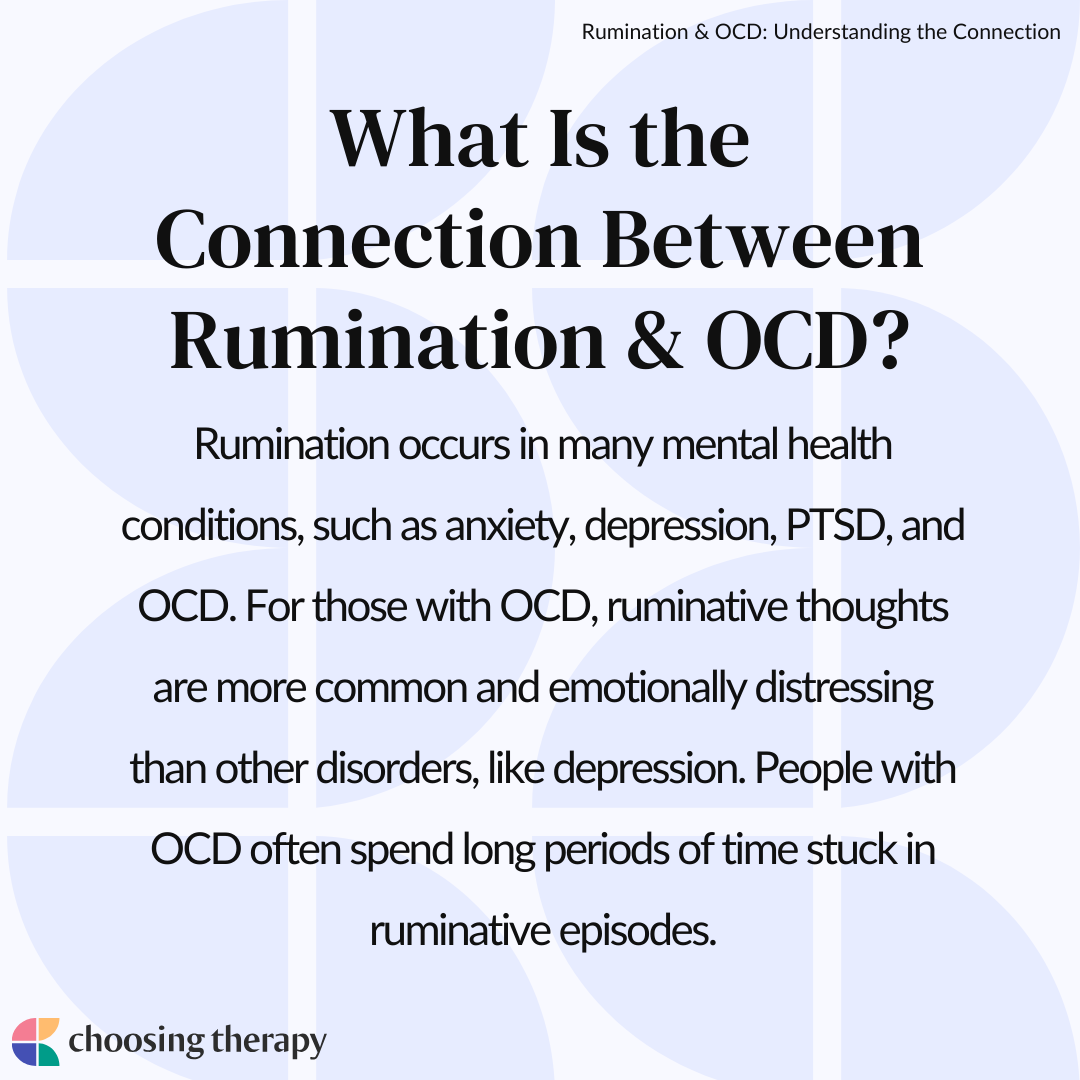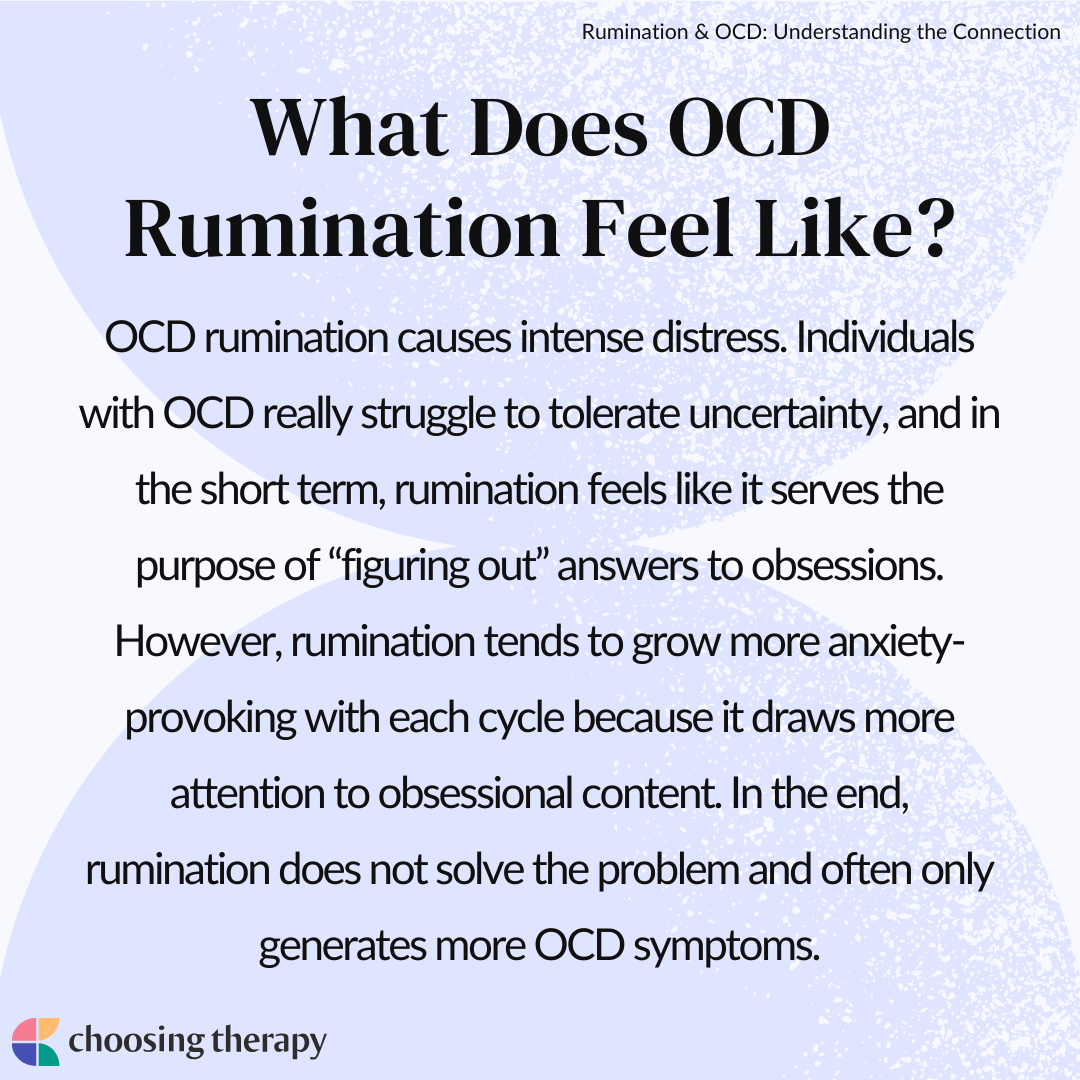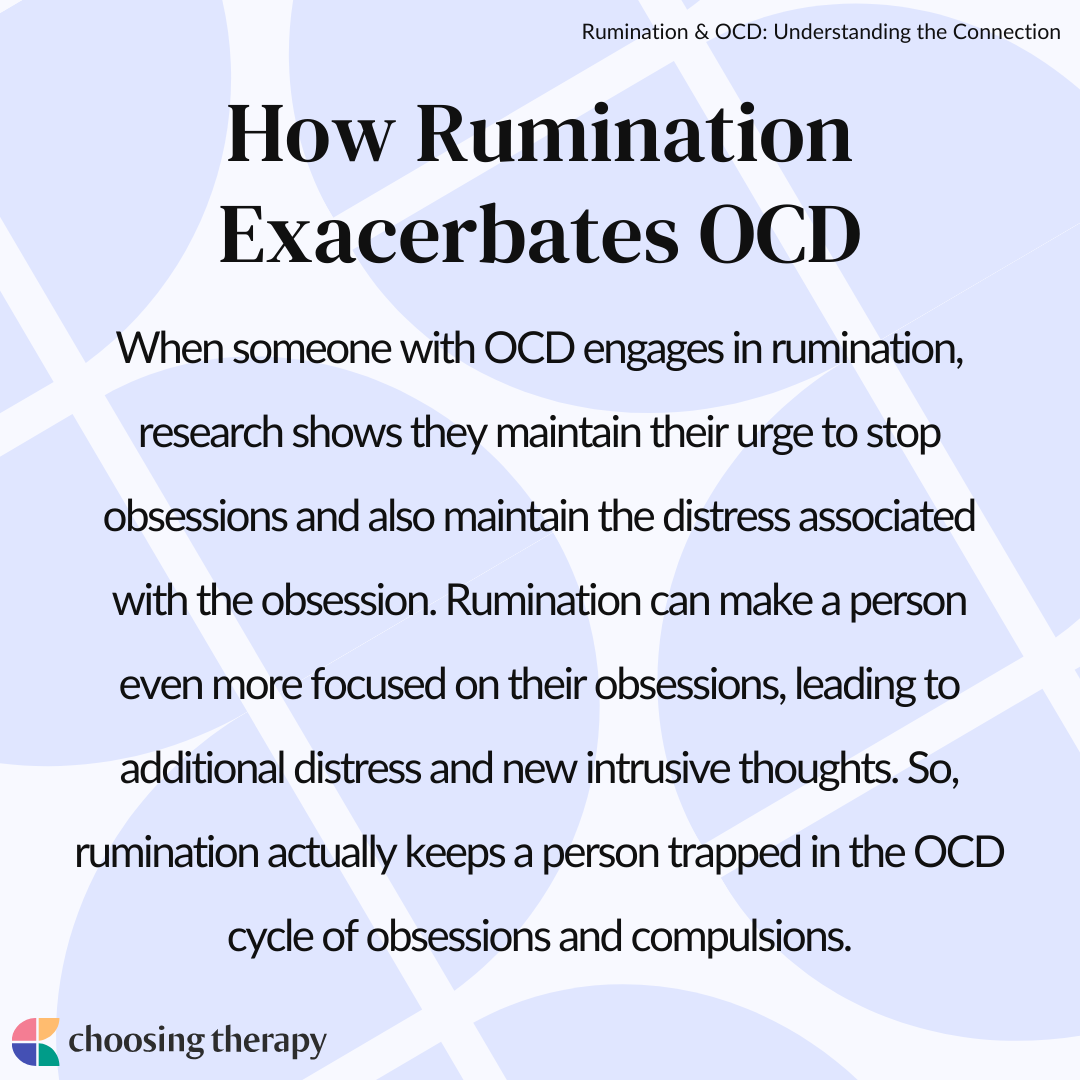Rumination is a common mental compulsion used by those with OCD to manage the distress caused by obsessions. OCD rumination looks like repeatedly going over intrusive thoughts, often with the impossible goal of figuring out a solution. OCD rumination provides relief in the short term, but long-term rumination only reinforces the content of intrusive obsessions.1
What is the best therapy for OCD? Exposure And Response Prevention Therapy (ERP) – Do live video sessions with a therapist specialized in ERP, the gold standard treatment for OCD. Treatment from NOCD is covered by many insurance plans. Start With A Free 15 Minute Call
What Is the Connection Between Rumination & OCD?
Rumination occurs in many mental health conditions, such as anxiety, depression, PTSD, and obsessive-compulsive disorder (OCD). For individuals with OCD, ruminative thoughts are more common and emotionally distressing than other disorders, like depression.2 People with OCD often spend long periods of time stuck in ruminative episodes.
Sometimes, rumination occurs about the obsession’s content, and other times, rumination occurs about OCD symptoms. For example, someone could have the intrusive thought, “What if I didn’t clean the counter enough before preparing food?” They could similarly ruminate after thinking, “Why do I have to have these types of thoughts when they don’t bother other people?”
Is Rumination a Compulsion?
Rumination is a mental compulsion for those with OCD. Mental compulsions are internal acts that a person performs following the experience of an unwanted obsession. Mental compulsions can include thought replacing, rumination, self-reassurance, and distraction. Rumination OCD is generally focused on a strong urge to feel okay and the belief that ruminating on obsessional content will help.
What Is the Difference Between OCD Rumination & Obsessions
OCD rumination is a type of compulsion, which is different from an OCD obsession. Obsessions are unwanted intrusive thoughts, images, or urges that cause distress for the person with OCD. When obsessions happen, a person can respond with compulsions to neutralize their anxiety. Rumination is one type of OCD compulsion that is commonly used.
What Does OCD Rumination Feel Like?
OCD rumination causes intense distress. Individuals with OCD really struggle to tolerate uncertainty, and in the short term, rumination feels like it serves the purpose of “figuring out” answers to obsessions. However, rumination tends to grow more anxiety-provoking with each cycle because it draws more attention to obsessional content. In the end, rumination does not solve the problem and often only generates more OCD symptoms.
How Rumination Exacerbates OCD
When someone with OCD engages in rumination, research shows they maintain their urge to stop obsessions and also maintain the distress associated with the obsession.3 Rumination can make a person even more focused on their obsessions, leading to additional distress and new intrusive thoughts. So, rumination actually keeps a person trapped in the OCD cycle of obsessions and compulsions.
Examples of Rumination in OCD
OCD subtypes may experience rumination differently.4 Someone with harm OCD may engage in rumination about the types of sharp objects they have in the house because of their fears of harming loved ones. Someone with existential OCD may engage in ruminating on the meaning of life. Someone with somatic OCD may ruminate on certain body parts with certain sensations and what this “means.”
Treatment for Rumination OCD
Treating OCD ruminations often includes both medication and therapy. Exposure response prevention (ERP) is the gold standard treatment for OCD because of its high success rates.1 Cognitive therapies may also be used with varying success rates.1 The most commonly prescribed medications are SSRIs, often given at higher doses than for anxiety or depressive disorders.1
A combination treatment plan using both medication and therapy is the most recommended course of treatment for OCD and rumination. Medication can help provide biochemical relief from ruminations, while therapy helps a person develop a new relationship to intrusive thoughts and compulsions.
Treatment For OCD NOCD: Online OCD Treatment Covered By Insurance – Regain your life from OCD. Do live video sessions with a licensed therapist specialized in treating OCD. Treatment from NOCD is covered by most major insurance plans. Learn how you can use your insurance benefits. Visit NOCD Talkiatry: Is OCD Medication Right For You? Speak with A Doctor – Talkiatry can match you with a psychiatrist who takes your insurance and is accepting new patients. They’re in-network with major insurers and offer medication management with supportive therapy. Free Assessment
Treatment for rumination OCD may involve:
Therapy for Managing Rumination OCD
The main therapy approaches for rumination OCD include cognitive and exposure-based therapies. The goal is to teach the person how to stop assigning meaning to the content of their intrusive thoughts. Through therapy, the person with OCD learns to tolerate feelings of uncertainty related to obsessions and slowly gains the confidence to face feared and triggering situations.
Effective therapy options for rumination OCD include:
- Exposure and response prevention (ERP): ERP for OCD is a form of therapy where a person slowly learns to confront different versions of their feared obsession. Through therapy, they gain mastery over their obsessions by learning that they are able to tolerate discomfort without engaging in compulsions.
- Cognitive behavioral therapy (CBT): CBT for OCD encourages the person with OCD to understand how their intrusive thoughts influence their emotions and behaviors. Through therapy, they learn how to challenge or reframe negative thinking patterns to experience more positive emotions and avoid engaging in compulsive rituals.
- Mindfulness-based cognitive therapy (MBCT): MBCT is a cognitive therapy that encourages the person with OCD to approach their intrusive thoughts with a non-judgmental attitude.5 Through therapy, they learn to assign more neutral meaning to the content of obsessions, leading to a reduction in anxiety.5
- Acceptance and commitment therapy (ACT): ACT for OCD helps the person develop a more accepting and non-judgmental relationship with obsessions and anxiety in order to stop fighting their intrusive thoughts.6 Through therapy, the person learns to live a life based on commitment to core values despite obsessions and compulsions.6
Medication for Managing Rumination OCD
Medications for managing OCD commonly include SSRIs, which have the least number of side effects and seem the most effective.1 SSRIs work to regulate levels of the neurotransmitter serotonin, which may be dysregulated in people who have OCD.1 Other medications that are sometimes prescribed for OCD include benzodiazepines and antipsychotics. Since these medications come with more side effects, providers only use these in cases where SSRIs are not working.
How to Cope With Rumination in OCD
Coping skills for OCD and rumination include techniques that help produce more adaptive thought patterns like mindfulness, thought challenging, and cognitive restructuring. Other strategies for coping with rumination OCD might be using humor, journaling, scheduling a worrying time, or using distractions. Similar to other conditions, understanding OCD triggers is also essential for coping with OCD rumination.
Here are eight ways to cope with rumination in OCD:
1. Mindfulness & Meditation
Rumination often happens because someone is caught up in experiences of the past or anticipating the future. Mindfulness and meditation for OCD can help encourage a person to feel comfortable engaging in the present moment. Through repeated practice of returning to the present, a person can learn to regulate their attention. This often leads to fewer experiences of rumination.
Here are a few mindfulness and meditation exercises to try:
- Mindful breathing: Mindful breathing encourages a person to slow down breathing, which often speeds up during experiences of anxiety. Through slow and focused breathing, a person can also slow the process of ruminative thoughts.
- Body scans: Body scans are meditative practices that encourage the intentional and focused scanning of body parts. The person is encouraged to draw attention to each body part in a methodical manner, which may provide a healthy distraction from ruminative content.
- Walking meditation: Walking meditation involves focusing on the present moment through sensory experiences while engaging in movement. Walking meditation provides helpful physical movement that can help a person get out of ruminative thinking and become more connected to the world around them.
- Loving-kindness meditation: Loving-kindness meditations often involve meditations of compassion toward self and others. This shift can be especially helpful for ruminations because ruminations are often focused only on painful experiences of self-perceptions.
2. Thought Challenging & Cognitive Restructuring
Thought challenging and cognitive restructuring are strategies that can help combat the negative thinking that spirals into rumination. People with OCD often struggle with negative automatic thoughts, like obsessions. Obsessions sometimes contain cognitive distortions, which are errors in thinking. Challenging those distortions can help a person reduce the intensity and frequency of their OCD ruminations.
For example, someone might believe because they feel that something is wrong (such as the way a desk is organized), they may need to change it to prevent something bad from happening. An alternative reframe might be, “Just because I feel something is wrong, doesn’t mean something is. Feelings are feelings and not facts. I am not going to step into the compulsion of ruminating and organizing right now.”
3. Journaling
Journaling and reflective writing are examples of positive rumination. Positive rumination is defined as repetitive thinking focused on positive emotions, such as states of happiness.7 In the same way that negative rumination causes you to think about negative events over and over, the goal of positive rumination is to think about positive events over and over. For example, you might have a goal every day to journal for five minutes about one positive event in your day and process your emotions around the event.
When a person increases the amount of time spent positively ruminating, they decrease the amount of time negatively ruminating, thereby reducing the harmful impact rumination has on their OCD.
How much do you know about OCD? Take This 11-Question OCD Quiz From NOCD. If you or a loved one are struggling with OCD, NOCD provides convenient, affordable, and effective OCD treatment covered by most major insurance plans.
4. Scheduled Worry Time
One of the biggest problems with rumination is that it seems to attack out of nowhere and last for a very long time. Scheduling a worry time is one tactic that often helps someone with OCD rumination reduce their chances of spiraling. It can also help with drawing attention to times and triggers for rumination.
Here’s how it works: decide on a specific time when you will worry. You can even set a reminder if that’s helpful. During the day, when you get the urge to ruminate, remind yourself: “I’m not going to do this now; I’ll save it for my scheduled worry time.” When it comes to your scheduled time, you may be surprised by how often you make the decision not to worry.
5. Interrupt With Humor
Rumination OCD often gets its power from feeling very serious and heavy. Humor is a common tactic used by OCD therapists to help break this pattern of seriousness. People with OCD often feel that rumination needs to be done to “figure out an answer” to obsessions. Humor helps play with the seriousness of OCD obsessions and ruminations, ultimately breaking the cycle.
For example, someone who is stuck in rumination about making the right career choice might decide to lean in with humor. They might think, “Of course I’ll make the wrong career choice and end up in a cardboard box on the side of the road. Maybe I could decorate the box nicely and make it feel like home. I should go ahead and buy one of those large moving boxes for my new house!” The more absurd the humor, the better.
6. Make a Decision & Stick With It
OCD ruminating thoughts often center on decisions a person needs to make. When this happens, one strategy is to quickly pick a decision and roll with it before OCD and rumination start. People with OCD often have difficulty tolerating uncertainty and fears of the “wrong” outcome. By making a decision right away, you refuse to engage in rumination.
7. Utilize Distraction When Appropriate
Rumination OCD often comes around during boredom and periods of stillness. Distraction is one way to cope with urges for rumination during these times. Of course, you don’t want to make this the only coping mechanism you have, but sometimes distraction can be healthy and helpful. For example, if you know a trigger is about to happen, you can make a plan to have healthy distractions on hand to cope.
8. Call Out the Rumination
One struggle with rumination is identifying when you’re doing it and stopping yourself. Tracking situations, people, and places that trigger your OCD rumination can support you in preparing for urges. Remember that rumination is a compulsion and only happens when you engage with OCD thoughts. Tracking triggers and learning to catch yourself before, or at least early on during rumination, can help you replace the compulsion with healthier coping strategies.
When to Seek Professional Support
OCD is often a lifelong mental health condition that needs medication and therapy to enter into OCD recovery. If OCD rumination is becoming a daily compulsion that is causing you to lose time and energy, it may be time to seek professional support. Especially if ruminative episodes surround themes like harm to yourself or others, professional intervention is needed.
An online therapist directory or online therapy platform can assist you in finding a therapist or counselor who understands OCD and rumination. Online psychiatrist options are accessible ways for medication management for rumination OCD.
In My Experience
To help our readers take the next step in their mental health journey, Choosing Therapy has partnered with leaders in mental health and wellness. Choosing Therapy is compensated for marketing by the companies included below. OCD Therapy NOCD: Effective, Affordable, & Convenient OCD Therapy Do live, face-to-face video sessions with a therapist who specializes in treating OCD and get 24/7 support between sessions. NOCD is covered by many insurance plans and is available nationwide. Visit NOCD Treatment From An Online Psychiatrist Talkiatry OCD is treatable. Talkiatry specializes in OCD and provides personalized care with medication and additional support. Get started with a short assessment. OCD Community - Free To Join! Join others who are overcoming OCD. Participate anonymously. Find support, connect, and overcome challenges with us. The community is managed by NOCD. Join The Community OCD Newsletter A free newsletter from Choosing Therapy for those impacted by OCD. Get helpful tips and the latest information. Sign-UpAdditional Resources
What to know when finding a therapist for OCD With so much information out there regarding providers and treatment options for obsessive compulsive disorder, it can be hard to know exactly where to start—especially when you have to consider everything from the type of provider to the different treatment methods, as well as how you’ll fit it into your busy schedule. Can OCD make it hard to make decisions? From choosing what to wear in the morning to picking what to eat for dinner, decision-making is a part of everyone’s daily routine. But for millions of people with Obsessive-Compulsive Disorder (OCD), making any choice can feel like a daunting, sometimes impossible task.